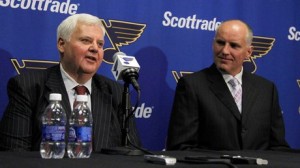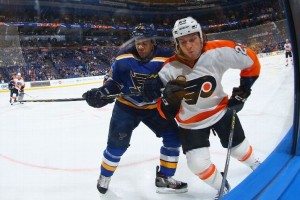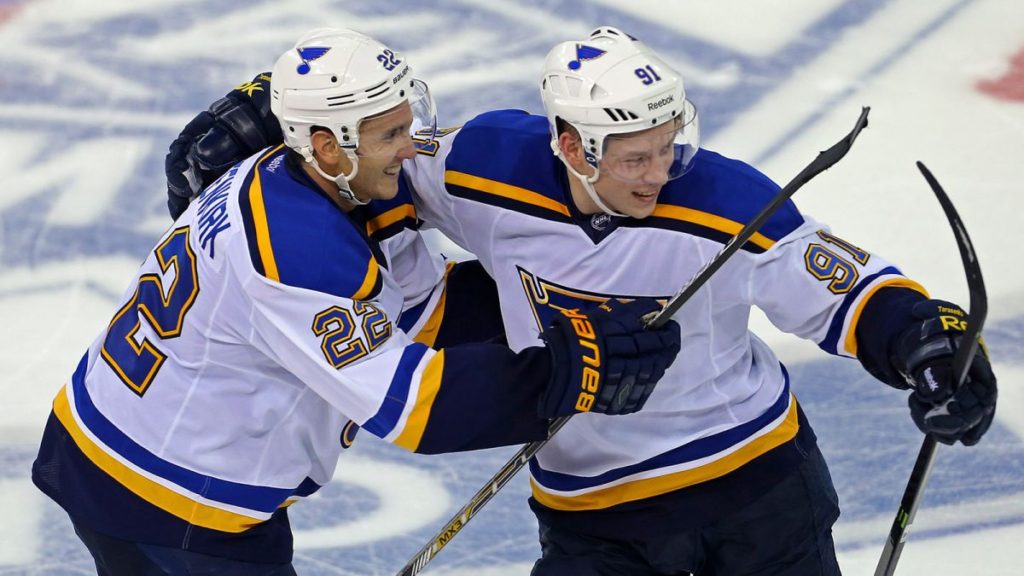It’s no secret that the St. Louis Blues have been struggling to score this season. It’s also fairly evident that their current 4-game losing streak is just the tip of the iceberg in regards to the organizational problems. Is it a coaching issue? Is it mismanagement from the front office? Do the Blues need different players? Do current players need to be held more accountable? Here’s a look into what’s beneath the surface of the Blues so you, the loyal Note faithful, can decide who’s at fault for each piece of the team’s recent crumbling puzzle.
As you press play on the Law & Order theme song to get your detective juices flowing keep in mind that there is not a magic pill, or roster move the organization can make to instantly turn things around. Hockey is and always will be a true team sport, and that goes beyond the on ice personnel. Everyone needs to work together for games (and playoff series) to consistently go their way.
Exhibit A: The Front Office
There have been talks about GM Doug Armstrong’s involvement in the problems facing the team for a few seasons now, which surfaced just a season after he won the GM-of-the-year award in 2011-12. Though Armstrong has made moves that further the team’s development, he has also made some questionable moves as well. Whether it be keeping younger guys in the AHL too long and then not giving them proper chances on the ice with the coach’s help, signing interesting contracts to seemingly sub-par players, or playing favorites based on old friends from his Dallas Stars era Army has a few major pitfalls laced in to his great management of the Note throughout his tenure.

Doug Armstrong is a great GM, but are his days in St. Louis numbered (photo courtesy of NHL.NBSsports.com)?
First off, his contracts to Steve Ott and Patrik Berglund (2-years, 5.2MM; & 3-years, 11.1MM respectively) made them almost immovable pieces to the Blues lineup, which for a majority of their tenure with the team, has hurt the Blues as much as it’s helped them. Though these are short-term problems for the team it has stifled on-ice play due to missed opportunities, poor passes, and bad penalties in key times of games during the regular and postseasons.
On top of that, bringing in some old Dallas friends isn’t always a recipe for success, considering Dallas was only able to make it out of the 1st-round of the playoffs 7 times during his 17 years with the club. He joined the Stars organization in 1991, they moved to Dallas in 1993, he was an Assistant GM when they won the Cup in 1999, and was appointed as the GM in 2002. He was then replaced as GM during the 2007-08 season after a 7-7-3 start to the year. However, Armstrong made moves while he was there that are still paying dividends for the Stars now.
He was able to draft players like Trevor Daley, Jamie Benn, James Neal, and Loui Eriksson. Trades to some of these players have brought the Stars to an even higher level, which is most of the reason they pace the NHL this season. Similarly, since joining the Blues in 2008 Army has been able to draft players such as Jori Lehtera, Alex Pietrangelo, Jake Allen, Jaden Schwartz, Colton Parayko, Robby Fabbri, Vladimir Tarasenko, and other current and future stars. Armstrong has proven he’s a good GM, and can piece together complete puzzles to make teams better, but does his relationship with Ken Hitchcock cloud his judgment?

Coach Ken Hitchcock and Doug Armstrong have major decisions to make moving forward (Photo courtesy of NHL.com).
Exhibit B: Coaching
While Ken Hitchcock also won the coveted Jack Adams award in 2011-12 (coach-of-the-year), he has been met with criticism from fans and players alike in years since. Players complain about his complex systems and fans dislike his overbearing attitude that stifles creativity. Just look at some quotes from former players under Hitch’s Blues regime:
“I think that you as a player are told so much that trying to remember every single thing that they’ve said and apply it…sometimes I start to over think what’s going on in every given little tiny situation because I’ve been told so much.” – Ian Cole
“I didn’t think the flu would be good for me, but coming back in tonight and not having to sit through all the meetings and same old practices, it really felt good to get out there. I was excited again to do something as simple as change well for the next guy coming out.”- TJ Oshie

Though Ken Hitchcock has also proven he’s a great coach (731-443-88-103 record in his NHL career), the last couple of seasons has shown he may need to rethink his coaching style. The game is evolving and his old-school, iron fisted way of coaching doesn’t allow players to reach their full potentials on the ice anymore. The game is a lot less about strictly sticking to systems now because of the pace at which it’s played, and the strength and skill of the players who play it. Yes, systems are still an extremely important part of the game, but they need to be guidelines for overall team play not rules of engagement. Hitch has also had limited postseason success outside of 2 back-to-back Stanley Cup finals appearances (98-00, won the Cup in 98-99). In his 17 NHL seasons he has only made it past round-2 5 times (losing in round-3 twice), and has only made it out of round-1 a total of 5 times as well.
As far as this season is concerned, Hitch promised to be more lax on the players so the team could create a faster, more dynamic game on the ice. However, his even more frequent line juggling hasn’t given many of the players much of a chance to find any sort of rhythm with teammates, which makes it pretty hard to find them open on the ice. That leads to even more over thinking when those guys try to ‘stick to the system,’ instead of reading the play as it unfolds.
Assistants
Though there are a multitude of assistant and associate coaches with the Blues, the main focus needs to be on 2 in particular. Ray Bennett and Brad Shaw have miraculously kept their roles with the Blues since 2006 despite the Blues going through 4 different head coaches over their tenure. Bennett’s primary role is a video analysis coach, yet the Blues seem to have more trouble after they’ve played an opponent. This isn’t necessarily a knock on Bennett as the team plays the game themselves, however if Bennett’s role is video analysis then why do the Blues have such limited success against teams they’ve played more than once this year?

Ray Bennett is a video analyst coach, but is he effective (photo courtesy of bleedinblue.com)?
Out of 13 teams the Note have played more than 1 time this season (29 games total) the team has only won 16 times. Even more disturbing is the fact that regardless of the first game’s result (whether it be a W or an L) the team has only won 9 of the repeat contests. Looking into Bennet’s past paints a clearer picture, because when he was with the Kings (6 years) the team only had 1 season (2001-02) where they were above 15th in the NHL in goals for and against per game, and in special teams (both PP and PK). That begs the question, what exactly is Bennett analyzing?
Brad Shaw is a different story. He primarily focuses on the defensive core, and overall the Blues D has been solid for much of his tenure. However, they have never been a truly shut down defense and have had multiple spells where they lose positioning, and leave opposing players unattended for high quality scoring chances and a multitude of goals. Looking into Shaw’s past shows that he’s always struggled to keep his team’s D-core successful.

Brad Shaw has been with the Blues since 2006. The team has only made it past the 1st round 1 time over that span (photo courtesy of NHL.com).
While an assistant coach in Tampa (1999-00) the team went 19-47-9-7 and only had 1 defenseman who wasn’t a ‘minus’ player. While with the Islanders in 2005-06 (as both an assistant and an interim head coach) the team was ranked 25th overall in both goals for and goals against, and the only defensemen that were ‘plus’ players played in less than 10 games the entire season. That’s not a good track record for coaching D.
Though he has shown he can help develop talent such as Alex Pietrangelo, Kevin Shattenkirk, and now Colton Parayko his long tenure without any postseason success makes fans wonder if he’s really a part of the solution, or if he’s just another part of the problem. Moving on from Shaw leaves fans looking at Kirk Muller, the newest edition to the coaching staff. He has a sporadic track record, and his special teams experience is not a great selling point. While coaching in Carolina from 2011-2014 he was never able to get his special teams above 17th in the league (and they were mostly stuck in the bottom 17% of the NHL). However, he has helped turn around the Blues PP as of late so maybe he’s finally figuring it out.

Exhibit C: The Players
The final piece of the crumbling puzzle is the players themselves. After all is said and done they need to be held accountable for their play on the ice. Regardless of what the coach is barking out, who they’re playing, and any other factors (such as injuries to teammates) it’s still their job to create scoring in every game. The ‘old core’ leadership group on the team has been consistently proving that they don’t have the extra gear needed for a long playoff run, and now seem to be letting their lax playoff style bleed in to their regular season.
The team may very well be in need of more fresh faces to move on from the current locker room mentality. This could help them shrug off losses better, string together more wins, and find that extra gear come playoff time. Though they can’t be faulted for low scoring when the lines are juggling multiple times a game, they need to bear down and find enough consistency with each other to give Hitch fewer reasons to frequently switch up the line combos.
There you have it. The case has been laid out for you, the fans, to decide who is truly at fault for past playoff blunders and current regular season inconsistencies/losses. Draw your own conclusions as to what direction the team needs to go, but never lose hope in them. Being a Blues fan may be a never-ending roller coaster ride that seems to always break down before it’s finished, but they have a ton of young stars and prospects who look to change that in the very near future.
Like what you’ve just read? Follow me on Twitter: @pep30


